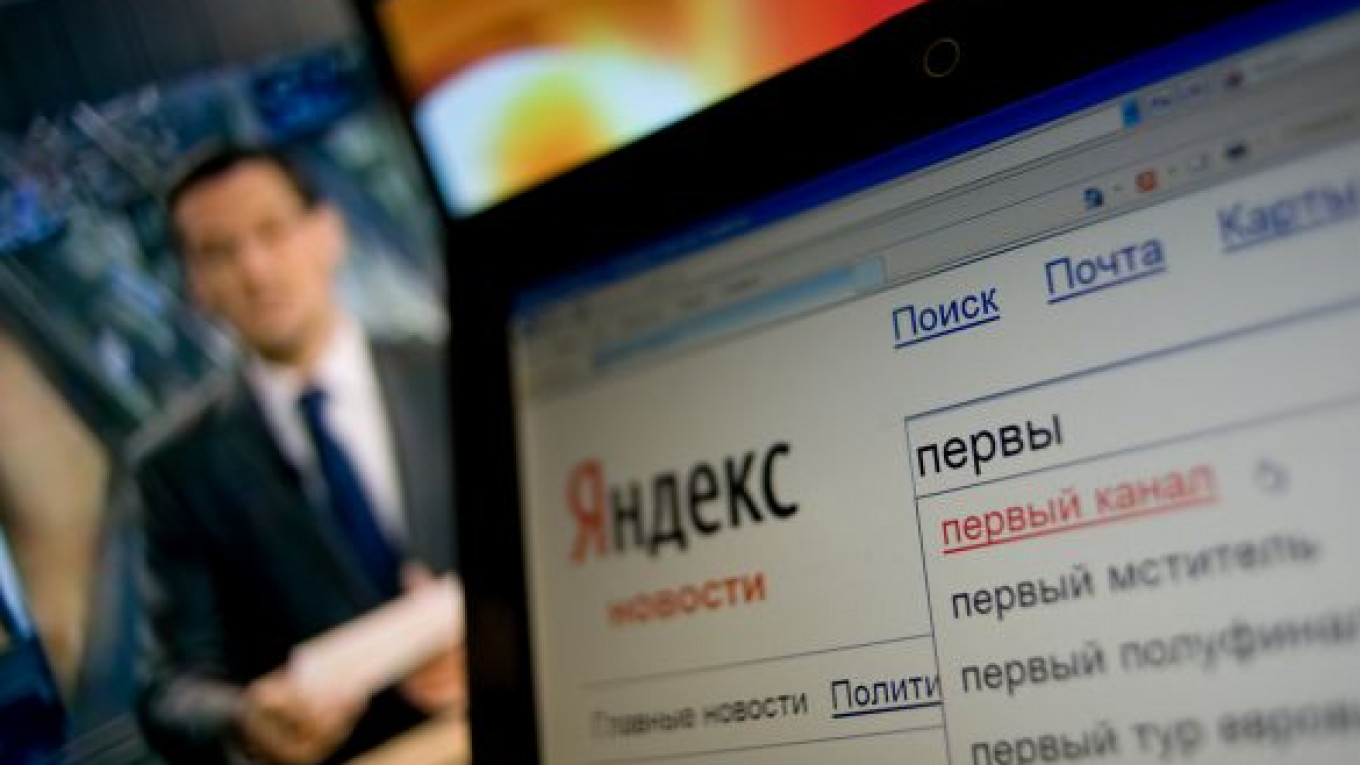The country’s biggest search engine, Yandex, saw more daily visitors last month than the number of any television channel’s viewers, and analysts said that’s an indication that in the near future the number of Internet users in Russia might exceed the size of TV audiences.
Yandex had a total of 19.1 million daily visitors in April, while the number of viewers of state-controlled Channel One — the country’s leading TV channel by viewers — reached 18.2 million, according to estimates by TNS Russia, which surveyed people between 12 and 54 years old in cities with a population of more than 100,000.
Yandex had more daily users than any other Internet project in Russia, according to the market researcher’s Web Index report, which put Mail.ru in second place, with 17.5 million daily visitors, while the country’s biggest social network, Vk.com, took third, with 16.2 million users each day.
The gap between the total daily TV audience and the number of daily Internet users was also narrow: 31.4 million of those preferring TV compared with 30.5 million consuming information online, TNS Russia said in e-mailed comments.
“It’s not the limit yet. We are likely to see even more TV viewers moving to the Internet,” said Konstantin Chernyshyov, an analyst at UralSib Capital.
Channel One has the biggest reach across the country, but the number of Internet users in Russia is steadily rising, because more people consider the Internet a source of information and penetration is growing, he said by telephone.
“The figures indicate a certain trend: more Russians are moving online. The reasons are growing incomes, decreasing prices for computer hardware and broadband Internet access, as well as increasing Internet penetration, including mobile Internet,” Investcafe analyst Ilya Rachenkov said in a note.
The convergence of various sources of information also plays its role, with products like Internet TV and Internet radio attracting more people, Rachenkov said.
“A traditional television can’t offer such flexibility and variety yet,” he said.
As a result, more advertisers might place bets on the Internet in the future, Chernyshyov said, adding that this segment is already growing rapidly.
Advertisers spent a total of 10.1 billion rubles ($325 million) on Internet promotion from January to March, representing a 43 percent surge from the first three months of last year, according to an estimate by AKAR, an industry association. Television saw nearly 32 billion rubles in advertising spending, up 10 percent from the first quarter of 2011, AKAR said on its website.
Advertisers’ behavior is driven by a stereotype that TV provides access to the broadest audience, but in fact socially active and well-paying consumers have already moved online, Yandex commercial director Alexei Tretyakov told Vedomosti last week.
Chernyshyov said it would take awhile for the Internet to overtake TV by the size of ad spending, since the latter still provides broader access to consumers, he said. There is a wide gap in penetration, with only 35 percent of households across Russia having Internet access compared with about 95 percent of them having a TV, he said.
Russians also spend more time watching TV than surfing the Internet, according to TNS Russia.
People spent an average of 63 minutes per day watching Channel One last month, compared with only 10 minutes per day spent on Yandex. Even attention leader Vk.com is not ready to unseat TV, although its users spent an average of 39 minutes every day last month on the social network, according to TNS Russia.
A Message from The Moscow Times:
Dear readers,
We are facing unprecedented challenges. Russia's Prosecutor General's Office has designated The Moscow Times as an "undesirable" organization, criminalizing our work and putting our staff at risk of prosecution. This follows our earlier unjust labeling as a "foreign agent."
These actions are direct attempts to silence independent journalism in Russia. The authorities claim our work "discredits the decisions of the Russian leadership." We see things differently: we strive to provide accurate, unbiased reporting on Russia.
We, the journalists of The Moscow Times, refuse to be silenced. But to continue our work, we need your help.
Your support, no matter how small, makes a world of difference. If you can, please support us monthly starting from just $2. It's quick to set up, and every contribution makes a significant impact.
By supporting The Moscow Times, you're defending open, independent journalism in the face of repression. Thank you for standing with us.
Remind me later.






